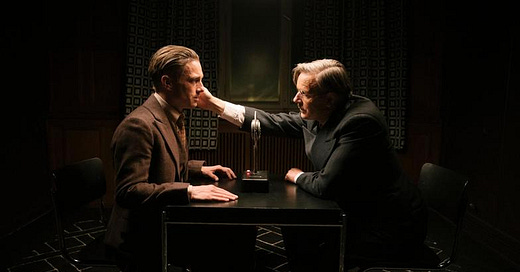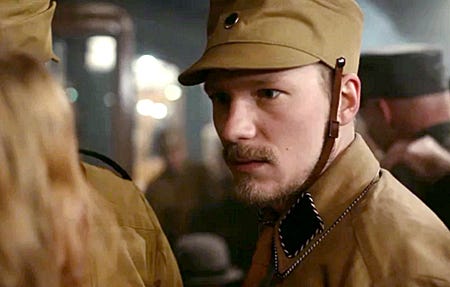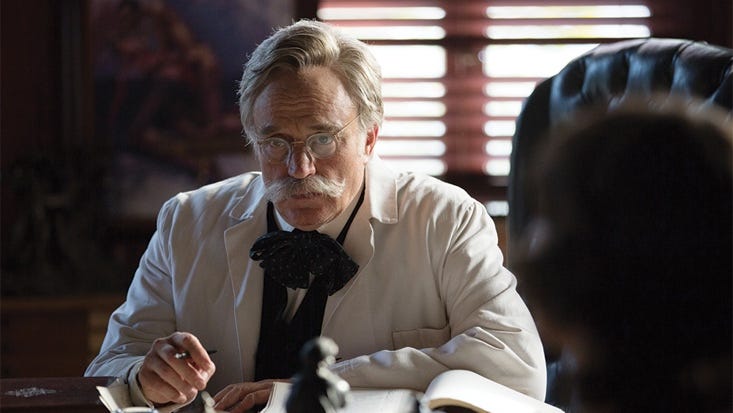Our Weimar, Our Selves
What are we searching for in returning over and over to the 1930s and figures like Magnus Hirschfeld?
At the end of the second season of the German noir series Babylon Berlin, a fifteen-episode arc unfurling an opaque communist plot takes a sudden and sharp turn when Greta Overbeck, reeling at the murder of her communist boyfriend Fritz by the police, comes face to face with the terrifying vertigo of fascist deception. Having been convinced by several communists to retaliate against Fritz’s murder by planting a bomb in the home of her employer, the Political Police Chief, Greta is floored to find her supposedly dead boyfriend very much alive among the throngs of an SA mob at a local train station. “Fritz,” it turns out, was really Richard, a Nazi partisan working clandestinely with his confederates to manufacture the entire plot to assassinate the police chief, a prominent Weimar socialist and Jewish politician. Pinning the murder on the communist party manufactured their alibi and ensured maximum political chaos. Greta, devastated at having unknowingly betrayed her boss for fascists, ends up in prison, unable to reveal the conspiracy at her trial because Nazis threaten to kill her child if she speaks.
Greta is not the protagonist of Babylon Berlin, a critically lauded series that chronicles the final manic years of Weimar democracy from the perspective of two detectives, Gereon Rath and Charlotte Ritter. Like many procedural and police shows, Rath and Ritter are strangely depoliticized by their noir environment, not so much because they are caught serving the Weimar government between Bolsehviks and Nazis on either side, but because they are detached in their dogged commitment to the truth of police work. Not so different from Olivia Benson on Law and Order: SVU, our detectives magically transcend the repressive function of the police because they stubbornly pursue their cases without regard to the politics of their superiors. Charlotte is a plucky, desperately poor queer woman who finds in detective work a way out of sex work and the culture of poverty of the looming Depression; Gereon, who is deeply traumatized by the loss of his brother in World War I, is more mysterious in motive. The show dwells on his strange relationship with Dr. Schmidt, a darkly modernist sort of psychiatrist who prescribes him heroin and leads him through all sorts of messy hypnosis sessions that seem only to threaten him with true madness. At the same moment that Greta learns the awful truth of fascist tactics, Rath finds himself once again in front of Schmidt, who hypnotizes him, upending his sense of reality even further. We are shown a surreal hypnosis scene in which it is intimated both that Gereon’s brother died because of his cowardly actions, and the suggestion that Schmidt, in a bizarre moment of melodramatic transference, might actually be Gereon’s brother.
The season ends like this, in total doubt as to the truth, both because of Schmidt’s psychological tactics and the revelation that Nazis secretly manufactured much of the central communist plot of the series.
Season three continues to muddy Schmidt’s character in the show’s characteristic cloak and dagger manner, developing him as an accomplished doctor who innovatively treats veterans with PTSD, but whose dabbling in the occult may suggest he is also waging some sort of psychological campaign on behalf of fascists eyeing their moment to seize power. The point of Babylon Berlin is that we can’t quite be sure. But it’s a noteworthy portrayal of an ambiguous doctor in an era where we are all too often told that medicine was on the verge of emancipating queer and trans people, no more so than in the famous Magnus Hirschfeld.
I’m a little obsessed with our contemporary obsessions with Hirschfeld. Much like the iconoclastic and congenial patriarch of American trans medicine, Harry Benjamin, Hirschfeld has a sort of maverick status on this side of the Atlantic. An activist doctor who championed the bourgeois German gay rights movement of the turn of the century, Hirschfeld famously founded the Institut fur Sexualwissenschaft in Berlin in 1919. The clinic and research center was a haven for Berlin’s inverts, homosexuals, and transvestites, who often worked odd jobs for Hirschfeld in exchange for medical care that included some of the first gender affirmation surgeries. As a politically progressive Jewish doctor and open homosexual, Hirschfeld was forced into exile in the early 1930s, before the Nazis violently destroyed the Institute in 1933. In one of their first major public book burnings, they set Hirschfeld’s massive library on fire.
For those who fantasize that knowledge is a progressive asset that would emancipate otherwise isolated and miserable trans subjects, this would amount to something like setting us back some mysterious amount of time. Now that we are living through another era of coordinated authoritarian, anti-Semitic, and conspiracy theorist driven attacks on trans people, the cultural fascination with what was lost in Hirschfeld seems, to me, something like a fear that history will repeat itself.
(The obsession with the manic pleasure of Weimar queer and trans culture seems, too, to be a sort of flirtation with the idea of nihilism in the face of implacable political forces, though I find this disappointing given that recent and ongoing historical events like the AIDS crisis give us plenty of object lessons in how to refuse nihilism without also refusing pleasure and pain.)
Perhaps the most idealistic fantasy of Hirschfeld and Weimar’s loss to Western transness comes in the now ignominious series Transparent’s second season, where the Los Angeles based Pfefferman family begins to reckon not just with their newly trans matriarch Maura, but her aunt, Tante Gittel (played brilliantly by Hari Nef), who was a trans woman living in Berlin in the 1930s. In a surrealistic, only partially diegetic thread that runs through the season, Maura’s daughter Aly (Gaby Hoffman) plays Gittel’s sister Rose (Maura’s mother) in Weimar Germany. Hirschfeld and the Institute are prominently featured in Gittel and Rose’s storyline, offering the young trans girl not just the possibility of medical transition, but more importantly a likeminded community that the audience is encouraged to view as profoundly tragic in its optimistic freedom, something that will soon be destroyed by Nazis.
In 2015, when this season of Transparent aired, the Weimar flashbacks earned more than a few raised eyebrows. Writing for The New Republic, Esther Breger observed that the show “became more explicitly mission-driven” in this iteration, “part of a restorative project to inscribe queer history onto American Jewish historical memory.” Yet she bristled at the “uncanny quality” of the Weimar story, which “veered from enigmatic fever dream to awkward stage play without explanation.” “I eventually came around to the Berlin narrative,” concluded Breger, “but only after deciding to view the flashbacks as less historical realism than imagined memory, a way for Aly to commemorate her queer Jewish ancestors by feeling her way into their trauma.”
Why Breger would have expected historical realism from a trans retelling of Weimar Berlin is frankly beyond me, but I’m a historian, so I want to dwell on the point. As a semi-mystical exercise in a Jewish historical imagination in which transness filiates through a family despite the impossible to grasp ruptures of the Holocaust, not to mention the upheaval of migration—first from Eastern Europe to Berlin and, then, from Germany to the United States—there is something moving to what Transparent attempts, however (un)successful Joey Soloway ends up at it. What nags at me is Hirschfeld. Do we really need a good doctor to certify the historicity of Tante Gittel and, by bizarre implied extension, the trans characters of the twenty-first century Los Angeles who somehow have no origin story? The absent “historical realism” of this season is curiously condensed into the figure of Hirschfeld, the hero of trans people who apparently could have been, if not for, you know, world historical events.
I don’t buy it.
If we act like something essential and irretrievable was lost in the destruction of the Institute, we would commit the same mistake as Transparent, which depicts Hirschfeld at the end of the season watching his magnum opus being destroyed in Berlin. In truth, the doctor’s story hardly ended with the Nazis and he was not present in Berlin for the Institute’s destruction. True, he went into exile and, having been in declining health for many years, didn’t live to see the end of the war. But Hirschfeld’s work didn’t end because Hitler’s cronies said so through spectacular violence. That is not a realistic takeaway from the 1930s.
Hirschfeld evaded the political crisis brewing in Europe by taking a somewhat ill-advised trip around the world, forming the material for his final book, which was unfortunately titled in English Women East and West: Impressions of a Sex Expert (1935). Maybe it wasn’t so unfortunate after all, as the book is typically Hirschfeldian: a rather superficial travelogue of an old man masquerading as a major scientific contribution to the field of sexual ethnology. Beginning in the US (he adores the utopian cultural mixing afforded by American settler colonialism), and leaving from there for Hawaii and Japan, Hirschfeld tours much of East and Southeast Asia, the Middle East, and North Africa. He avoids German colonies, of course, while penning a long-winded attack on the evils of British Colonialism whenever he has the chance, particularly in India. While in China, Hirschfeld also came into the employ of a handsome boy, Li Shiu Tong, who was pursuing a promising career as a sexologist. Hirschfeld took him on as a boyfriend for the rest of his travels and was attended by him when he died in 1935.
In other words, the end of the Institute hardly rubbed out Hirschfeld’s positivist project of sexual science; in the final years of his life, it carried an increasingly global and colonial currency, making ever more sweeping claims about the widespread existence of homosexuality and transvestism around the world insofar as they could be brought under the watchful eye of scientific reason. This final book’s ethnocentrism about the “primitive” non-white cultures that so titillated the aged Hirschfeld ought to give us some serious pause about thinking we lost something straightforwardly emancipatory in the 1930s.
What’s more, Hirschfeld’s ethnological brand of sexology is, arguably, more alive than ever today, albeit in a frequently unacknowledged, vernacular form: contemporary Anglo-American taxonomies of endless gender and sexual categories. Indeed, anyone who reads Women East and West might reach an uncanny conclusion that outpaces even Transparent’s manic fever dream. The ostensibly radical imperative to classify every minute difference of an interior gender identity and inborn sexual orientation that typifies so much middle-class, English speaking queer and trans politics today is something like the ultimate fulfillment of Hirschfeld’s dream of a universal scientific grammar of sexual custom. The old European dream of positivist science that colonizes every permutation of gender and sexuality around the world easily survived the real differences between socialism and fascism, or liberal democracies and fascist dictatorships, or global south colonies and settler colonies.
What I mean to say is: what we are apparently searching for in retelling stories about Weimar Germany is a substitute for our own lack of imagination about the present.
This is where I find Babylon Berlin’s Schmidt far more compelling as a Weimar era doctor to ponder in 2021. By contaminating the clinical relief from trauma with the possibility of a fascist psychological warfare project, the entire edifice of our historical longing for queer and trans clarity in the pre-fascist era is undermined. Much like Greta, we twenty-first century viewers staring down the barrel of today’s iteration of fascists cannot take comfort in the wish that things were, at some point long ago, clear and unambiguously queer and trans. Babylon Berlin comes much closer to suggesting that there was no fall or original sin but the intrinsic structure of European modernity.
Beware anyone who naively presumes we need tales of trans Weimar Germany to guide us today.







Great article, Jules! Have to check out Babylon Berlin.
I'm just reading "Queer." by Benno Gammerl, a historians attempt to give an overview about queer history in Germany. What *is* very evident when one looks at the past 100 years is that our current situation and discourse looks *very* familiar, including the factions of the queer rights movement and there was definitely a huge setback after WW2 in Germany which lasted at least until the 60s-70s.
Hirschfeld definitely was an important figure in that time in the pursuit of gay and gender non-conforming rights but he also had some questionable views. AFAIK he was not quite immune to the eugenicist and racist views of the time.
I don't know the origin, but I guess "History does not repeat but it rhymes" is good to apply here. A major difference today is that we do no longer have §175. Police cannot arrest you for being gay. But German authorities do deport queer people to countries where they will suffer torture or worse.
If you look at the UK or look at the "Deutscher Ärztetag", we are not very far from families with trans children being persecuted, reported to the authorities, etc. Outright fascists as in "Nazi parties" not even necessarily needed. German CDU might be on board with this and is likely to be elected.
Many gay people were surprised at how fast they were persecuted when the fascists took over. I guess it is not the worst idea to learn from that and prepare. Without taking at as a given and without unnecessary doomerism. Fighting and preventing this is still the preferred outcome.